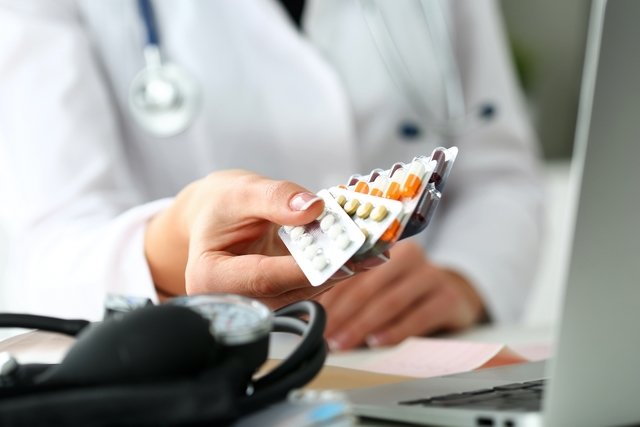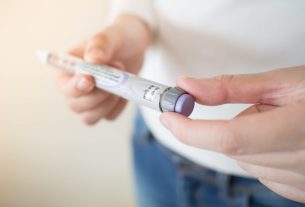Medicines for genital herpes, such as acyclovir, valacyclovir or famciclovir, have antiviral action that help prevent the virus from multiplying. Herpes simplexprevent infection of new cells and reduce the duration of symptoms.
In addition to these medications, the use of lysine hydrochloride or β-glucan dietary supplements may also be recommended by your doctor, as they help to strengthen the immune system, preventing new episodes of genital herpes.
Medications for genital herpes should be prescribed by a gynecologist, in the case of women, or a urologist, in the case of men, after assessing the symptoms and their severity, in addition to the immune system's ability to fight infections. See also other types of herpes and how to treat them.

Main medications
The main medications for genital herpes that may be recommended by your doctor are:
1. Acyclovir
Acyclovir is an antiviral indicated for initial or recurrent genital herpes, as it works by preventing the multiplication and activity of the herpes simplex virus, helping to reduce pain and allowing a faster recovery.
This medicine can be provided free of charge by the SUS in the form of 200 mg tablets, 50 mg/g dermatological cream or 250 mg injection, as long as it is medically indicated.
The acyclovir tablet in doses of 200 mg and 400 mg and the 50 mg/g dermatological cream can also be purchased in pharmacies as a generic or under the names Zovirax, Ezopen or Herpesil, for example.
How to use: The dose of tablets for adults is 200 mg, 5 times a day, with an interval of at least 4 hours between doses, skipping the evening dose. Treatment must be carried out for 5 days, and must be extended by the doctor in cases of severe initial infections.
Acyclovir ointment should be used by applying a layer on the genital herpes blister or wound, 5 times a day, at intervals of approximately 4 hours, skipping application at night, for 5 days of treatment, as per medical advice. See how to use acyclovir.
2. Fanciclovir
Famciclovir is another antiviral indicated for the treatment or prevention of recurrent genital herpes.
This medicine is a pro-drug, that is, it converts into penciclovir after being ingested, which is the active form, reducing the multiplication of the virus Herpes simplexpreventing the infection of new cells and reducing the duration of symptoms.
Famciclovir can be found in pharmacies or drugstores in the form of 125 mg and 500 mg tablets under the trade name Penvir, sold with a prescription.
How to use: The recommended dose for adults is 250 mg, 3 times a day, for 5 days, for the first episode of genital herpes. In the case of recurrent genital herpes, the dose is 125 mg, twice a day, for 5 days.
In the case of suppression of recurrent genital herpes, the dose is 250 mg, twice a day, for 1 year of treatment. Find out how to take famciclovir correctly.
3. Valaciclovir
Valacyclovir is also an antiviral indicated for the treatment of initial or recurrent genital herpes, as it shortens the duration of symptoms and prevents the virus from infecting other cells, as it prevents the virus from multiplying. Herpes simplex.
Valacyclovir can be purchased from pharmacies with a prescription, in the form of 500 mg tablets under the trade names Valtrex, Denpryx or Herpstal.
How to use: the dose for adults is 1 tablet of 500 mg, twice a day, for 7 to 10 days of treatment for initial episodes of more severe genital herpes. For recurrent genital herpes, treatment should last 3 to 5 days, as advised by the doctor. Check out how to take the valacyclovir tablet.
4. Penciclovir
Penciclovir is an ointment generally indicated for the treatment of cold sores, but it can also be recommended by the doctor for genital herpes, as it reduces the severity of the wounds and accelerates the recovery and healing of the skin.
This ointment can be used to complement treatment with tablets and is found under the name Penvir Labia.
How to use: Apply the ointment to the intimate area with a blister or wound, approximately every 2 hours, for 4 days, during the day. If symptoms do not improve within 4 days, you should consult your doctor again. See all ointment options for genital herpes.
5. Lysine hydrochloride
Lysine hydrochloride is a food supplement indicated to help prevent and avoid recurrent herpes virus infections.
Lysine is an essential amino acid that is not produced by the body and acts on the immune system, helping to strengthen it and preventing the replication of the herpes simplex virus.
This supplement can be found under the name Resist in the form of 500 mg capsules, and must be used under medical advice.
How to use: the dose for adults ranges from 1000 mg to 3000 mg per day, orally. Generally, a dose of 1 capsule of 500 mg is recommended, 3 times a day, taken with food, for 6 months of treatment. The use of lysine hydrochloride capsules should be started in the first stage of recurrent herpes. Learn more about lysine.
6. β-Glucana
β-glucan (β-1,3-D-glucopyranose) is an immunomodulator that increases the body's defenses and is indicated for chronic viruses, such as yeast infection. Herpes simplex type 1 and type 2, which includes genital herpes, avoiding recurrent episodes.
This medicine is found under the name Immunoglucan in the form of an injection to be applied directly to the muscle, by a healthcare professional, under medical supervision.
Furthermore, β-glucan can also be found as a food supplement associated with zinc and vitamin C, in the form of syrup or capsules for oral use, called Immunoglucan DS.
How to use: The application of injectable Immunoglucan must be done directly into the muscle, with a dose of 1 mL being recommended for adults, every 7 days, until the contents of the vial containing 5 mL in total are used up.
In the case of syrup, the dose for adults is 10 mL (1 measuring cup), once a day. As for capsules, the recommended dose for adults is 1 to 2 capsules per day, according to medical advice.
7. Idoxuridina
Idoxuridine is a topical antiviral indicated for the treatment of lesions caused by the virus Herpes simplexwhich includes genital herpes, reducing the severity of symptoms, as well as their duration.
This medicine is found under the name Herpesine, containing 1 tablet with 10 mg of idoxuridine and 1 bottle with dilution solution, and should be used with medical indication and guidance.
How to use: Add the tablet to the bottle with diluent solution and shake until the tablet is completely dissolved. Then, using the plastic applicator provided in the packaging, apply the solution to the genital herpes lesions, 3 to 4 times a day.
Treatment with idoxuridine should be started as soon as possible, as soon as herpes symptoms appear and should be continued for another 3 to 5 days after the lesions disappear. Discard what is left of the solution after finishing the treatment.
8. Paracetamol
Paracetamol is an analgesic that can be used to help alleviate the pain and discomfort caused by genital herpes lesions.
This medicine should not be used by people who have liver problems, such as liver failure, or who abuse or constantly use alcoholic beverages.
How to drink: the normally recommended dose for adults is 1 to 2 tablets of 500 mg of paracetamol, 3 to 4 times a day, according to medical advice. The maximum dose per day is up to 8 tablets of 500 mg, in divided doses, over a 24-hour period. See also how to take paracetamol drops and syrup.
9. Ibuprofen
Ibuprofen is an anti-inflammatory that may be recommended by your doctor to help alleviate the pain and discomfort of genital herpes lesions, as it helps reduce the production of inflammatory substances in the body.
This medicine should not be used in cases of dengue fever, stomach ulcers, gastrointestinal bleeding or liver, kidney or heart failure, and should also not be used by pregnant or breastfeeding women.
How to use: the normally recommended dose for adults is 1 tablet of 400 mg, every 6 to 8 hours, according to medical advice. Learn how to take ibuprofen correctly.
Medicine for genital herpes in pregnancy
During pregnancy, genital herpes must be treated by an obstetrician, who may recommend the use of antiviral drugs, such as acyclovir or valacyclovir, for example.
The dose and duration of treatment must be advised by the doctor, according to the trimester of pregnancy, as well as whether it is the first episode of genital herpes or whether it is recurrent episodes.
Genital herpes during pregnancy should always be treated with guidance from an obstetrician, as there is a risk of contamination of the baby and neonatal herpes, especially if the first episode occurs within 6 weeks of the date of birth.
In these cases, in addition to treatment with medication, the doctor must recommend a cesarean section. Better understand the risks of genital herpes during pregnancy and how it is treated.
Genital herpes definitive treatment
There is no definitive treatment for genital herpes, as the medications do not eliminate the virus from the body, but only reduce the multiplication of the virus, reducing the duration of symptoms and preventing the infection of new cells in the body.
The virus of Herpes simplex It is capable of remaining inactive in the body and being reactivated when the immune system is weakened, resulting in episodes of genital herpes. Know how to identify the symptoms of genital herpes.
How to speed up the healing process of genital herpes?
To speed up recovery and healing from genital herpes, it is recommended:
- Use the medicine for genital herpes recommended by your doctorcorrectly;
- Apply cold compresses to the lesions, to relieve pain and discomfort. Do not apply ice directly to the wound, as it may worsen symptoms;
- Urinate with your genitals dipped in warm water or use the hygienic shower. In the case of women, move the edges of the genital region away so that urine does not settle on the lesions;
- Do not pick or touch genital herpes lesionsas it can spread to other regions of the body, in addition to increasing the risk of infections in the lesions;
- Use ointments only if indicated by the doctor;
- Wear cotton underwearto allow the skin to breathe;
- Wash the intimate area with water and intimate soapsoftly;
- Keep wounds dry at all timesdrying well after washing or leaving to air dry.
Furthermore, intimate contact should be avoided while there are lesions, even with a condom, to avoid transmitting genital herpes to your partner.
It is also important to rest and eat an anti-inflammatory diet to help strengthen the immune system and recover faster from genital herpes. See the full list of anti-inflammatory foods.



